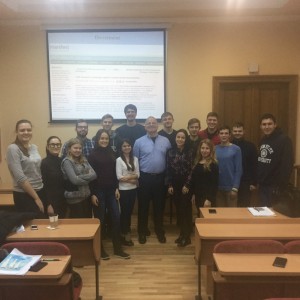Geoffrey Mazullo, Adjunct Professor, School of American Law (SAL) delivered a series of lectures on corporate governance – December 2-4, 2016 – and corporate social responsibility (CSR) – December 9-11, 2016 – as part of the School of American Law (SAL) in Lviv, Ukraine. The SAL is a joint program of Chicago-Kent College of Law and Ivan Franko National University of Lviv, Ukraine.
This year’s SAL in Lviv cohort includes 18 participants, representing upper class law students and recent graduates from Kyiv, Lviv and Odessa.
The corporate governance lectures covered the following topics: corporate governance models (including the Anglo-US, German, Korean, Japanese and Polish models); disclosure regimes; the legal and self-regulatory framework for corporate governance; monitoring of corporate performance by institutional investors; the rights and responsibilities of corporate organs, including the annual general meeting of shareholders, the board and management; shareholders’ rights; and the use of governance information by shareholders and stakeholders.
Students were exposed to financial, legal and practical aspects of corporate governance in several jurisdictions by analyzing and discussing a number of case studies about real companies (in France, India, Japan, Poland, Sweden and the United States). Students read the case studies and then analyzed them individually and in small teams. The case studies were discussed interactively, with individual students and teams presenting their views. Each of the case studies was authored or co-authored by the course instructor, Geoffrey Mazullo, Principal, Emerging Markets ESG and Adjunct Professor, School of American Law (SAL).
In addition, students learned how corporate governance models develop due to country-specific conditions and factors (including culture, geography and history) and compared and contrasted the shareholder model with the stakeholder model of corporate governance.
The CSR lectures covered: the evolution of CSR; expert opinions about CSR, environmental, social and governance (ESG) indicators and socially responsible investment (SRI); ESG disclosure in developed and emerging markets; and SRI – from the perspective of policy (regulation and self-regulatory environment), products and performance. Students analyzed case studies about companies in developed countries and emerging markets.